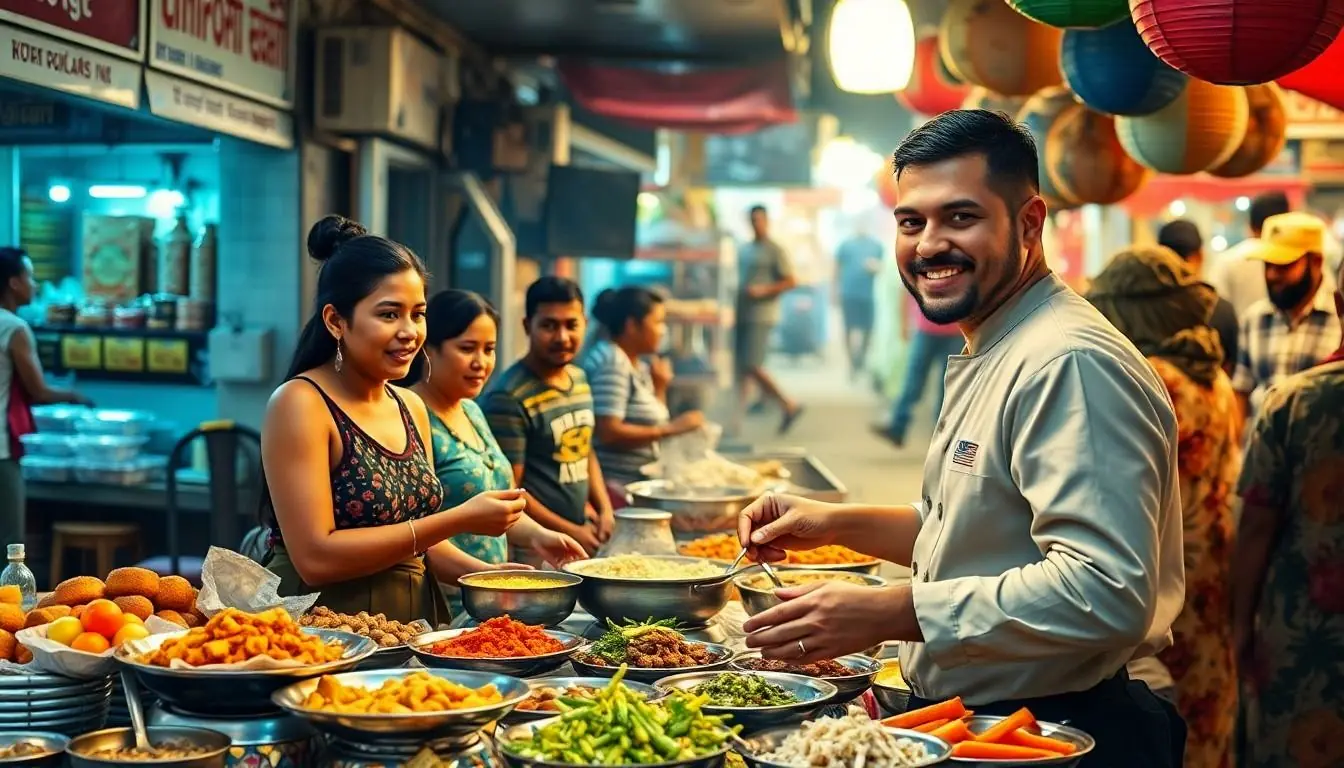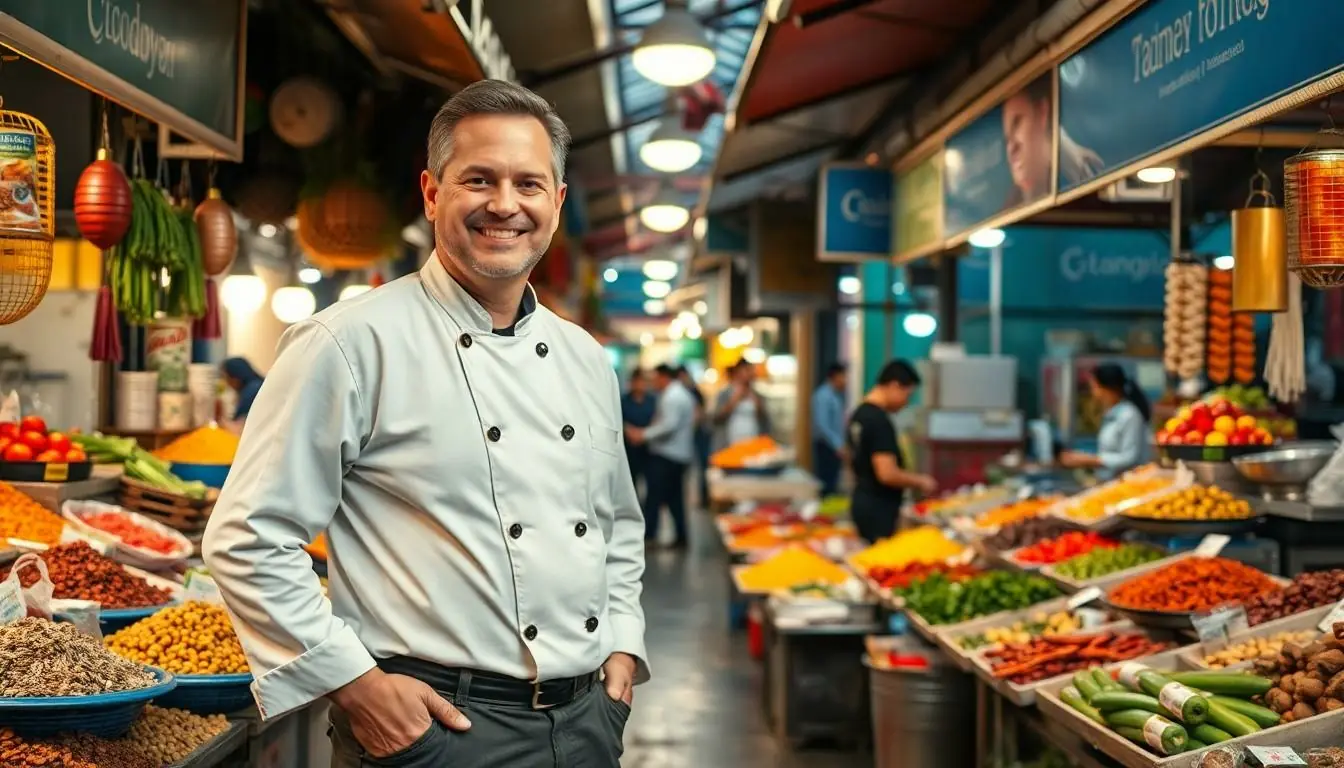Food travel shows are the ultimate feast for the senses, blending the thrill of adventure with mouthwatering culinary delights. Imagine exploring vibrant markets in Bangkok while drooling over street food or sipping wine in a sun-drenched vineyard in Tuscany. These shows invite viewers to savor the world, one delicious bite at a time.
Table of Contents
ToggleOverview of Food Travel Shows
Food travel shows capture the essence of culinary exploration worldwide. They showcase diverse cuisines while incorporating elements of adventure. Viewers embark on journeys through bustling food markets, local eateries, and picturesque landscapes.
Many popular series feature hosts who immerse themselves in different cultures. They taste authentic dishes, engage with local chefs, and explore regional traditions. These encounters enrich the viewing experience by offering insights into the significance of food within each culture.
Recent trends in food travel shows reveal an increasing focus on sustainability. Programs now highlight farm-to-table practices and the importance of supporting local producers. Chefs and hosts emphasize responsible sourcing, which resonates with eco-conscious viewers.
Food travel shows also foster a greater appreciation for global flavors. Enthusiasts often discover unique ingredients unfamiliar to them. Recipes featured in these shows inspire viewers to recreate dishes at home, bridging cultural gaps through cooking.
The formats of food travel shows vary significantly; some focus on specific regions while others spotlight themes like street food or high-end cuisine. Interactive elements, such as social media engagement, allow audiences to share their experiences and recommendations, further enhancing the community aspect of food discovery.
Food travel shows combine adventure and gastronomy seamlessly. They inspire curiosity about global cultures while engaging viewers with tantalizing visuals and stories.
Popular Food Travel Shows

Food travel shows captivate audiences with their blend of culinary adventure and cultural exploration. Various popular programs highlight distinct cuisines and traditions.
Signature Shows to Watch
“Anthony Bourdain: Parts Unknown” showcases global flavors while exploring unique cultures. “Chef’s Table” presents intimate profiles of acclaimed chefs, offering a glimpse into their culinary philosophies. “Street Food” takes viewers on a journey through vibrant street markets, revealing local dishes and hidden gems. “Somebody Feed Phil” features Phil Rosenthal as he visits diverse cities, connecting with locals and savoring their culinary offerings. “Bizarre Foods” challenges perceptions with unusual dishes from around the world, emphasizing the diversity of ingredients and taste.
Notable Hosts and Chefs
Anthony Bourdain’s charisma and storytelling transcended cuisine, making him an iconic figure in food travel. David Chang’s innovative approach inspires viewers with contemporary takes on classic dishes. Ina Garten focuses on home cooking, emphasizing simplicity and freshness in her vibrant recipes. Delia Smith’s warmth engages audiences, showcasing traditional British comfort food with a modern twist. Lastly, Graham Elliot, with his energetic personality, blends culinary expertise with accessible recipes, making food accessible to everyone.
Impact of Food Travel Shows
Food travel shows significantly influence perceptions and experiences related to culinary exploration. They entertain, educate, and inspire viewers to engage with diverse food cultures.
Cultural Exchange Through Cuisine
Cultural exchange profoundly occurs through cuisine in food travel shows. These shows highlight traditional dishes that reflect the values and lifestyles of various communities. Engaging with local chefs and home cooks fosters an understanding of the culinary significance tied to cultural identities. Food not only serves as sustenance but also as a medium for storytelling, showcasing history and heritage. Shows connect viewers with unfamiliar cultures by emphasizing local ingredients and cooking techniques. This connection cultivates respect and appreciation, allowing viewers to explore cultures without leaving home.
Influence on Travel Trends
Travel trends shift in response to the influence of food travel shows. Viewers often prioritize destinations noted for their unique culinary offerings. New trends emerge as audiences seek authentic experiences that food travel shows promote. Enthusiasm for gastronomy drives travelers to explore local markets and street food scenes, fostering a demand for immersive travel packages. Additionally, culinary tourism has gained traction, with travelers eager to learn cooking from local chefs. Captivating visual storytelling adds to the allure, encouraging spontaneous travel decisions focused on food experiences.
Critical Reception and Viewer Engagement
Food travel shows enjoy widespread appeal among diverse audiences, drawing in viewers from various age groups and backgrounds. Research indicates that millennials and Gen Z, often more tech-savvy, comprise a significant portion of the audience. These viewers seek immersive experiences and culinary adventures while valuing authenticity and sustainability in food representation.
Audience Demographics
Demographic data highlights a substantial representation of food enthusiasts aged 18 to 44 in viewership statistics. Both genders show interest, with women slightly leading audience engagement. Food travel shows also resonate with audiences who prioritize experiences over material possessions, indicating a growing trend toward culinary exploration among eco-conscious consumers. Additionally, families often watch together, creating shared experiences around food culture that strengthen social connections.
Reviews and Critiques
Critical reception varies across platforms, with food travel shows receiving acclaim for their storytelling and depth. Critics frequently highlight successful shows like “Anthony Bourdain: Parts Unknown” for their cultural insights and emotional resonance. Positive reviews often emphasize the effectiveness of visual storytelling and the engaging personalities of hosts. However, some critiques arise regarding the oversimplification of complex cultural narratives, suggesting the need for more nuanced presentations. Viewer feedback also reflects appreciation for authenticity, influencing the industry’s evolution toward more responsible and inclusive storytelling practices.
Future of Food Travel Shows
Viewers increasingly seek authentic culinary experiences, prompting food travel shows to evolve. Sustainability trends guide productions toward environmentally responsible practices. Programs now feature chefs who prioritize local ingredients, reflecting a shift in audience expectations. Interactive formats enhance viewer engagement, allowing for shared experiences online.
Culinary tourism continues to grow, with travelers focusing on destinations celebrated for unique food offerings. Shows that highlight immersive local experiences draw significant interest. Younger audiences, particularly millennials and Gen Z, prefer authenticity in storytelling, influencing how networks develop future content.
Emerging technologies, like augmented reality, may offer new layers of interaction in food travel shows. Virtual tours of markets and cooking classes could transform viewer participation and expand their culinary education. Enhanced storytelling through captivating visuals remains essential, as audiences respond to well-crafted narratives that inspire exploration.
Regional cuisines receive increased attention, showcasing the diversity of global food cultures. Shows featuring lesser-known dishes from various communities help preserve cultural traditions. Engaging local chefs and home cooks fosters a deeper understanding of culinary significance while promoting cultural exchange.
Critiques of oversimplification in narratives push creators to adopt more nuanced approaches. Authentic representation of cultures resonates with audiences, leading to a demand for responsible storytelling. As food travel shows continue to adapt, they maintain their role in connecting viewers with the rich tapestry of culinary exploration worldwide.
Food travel shows have become a vital part of the culinary landscape. They not only entertain but also educate viewers about diverse cultures and cuisines. As audiences seek authenticity and sustainability, these shows adapt to meet their evolving preferences.
The impact of notable hosts and engaging storytelling fosters a deeper appreciation for global flavors. With the rise of culinary tourism and immersive experiences, food travel shows inspire viewers to explore new destinations through their palates.
As technology continues to evolve, so will the ways in which these shows connect people with food. The future promises even more innovative formats and engaging narratives, ensuring that the journey through global cuisine remains exciting and enriching for all.





